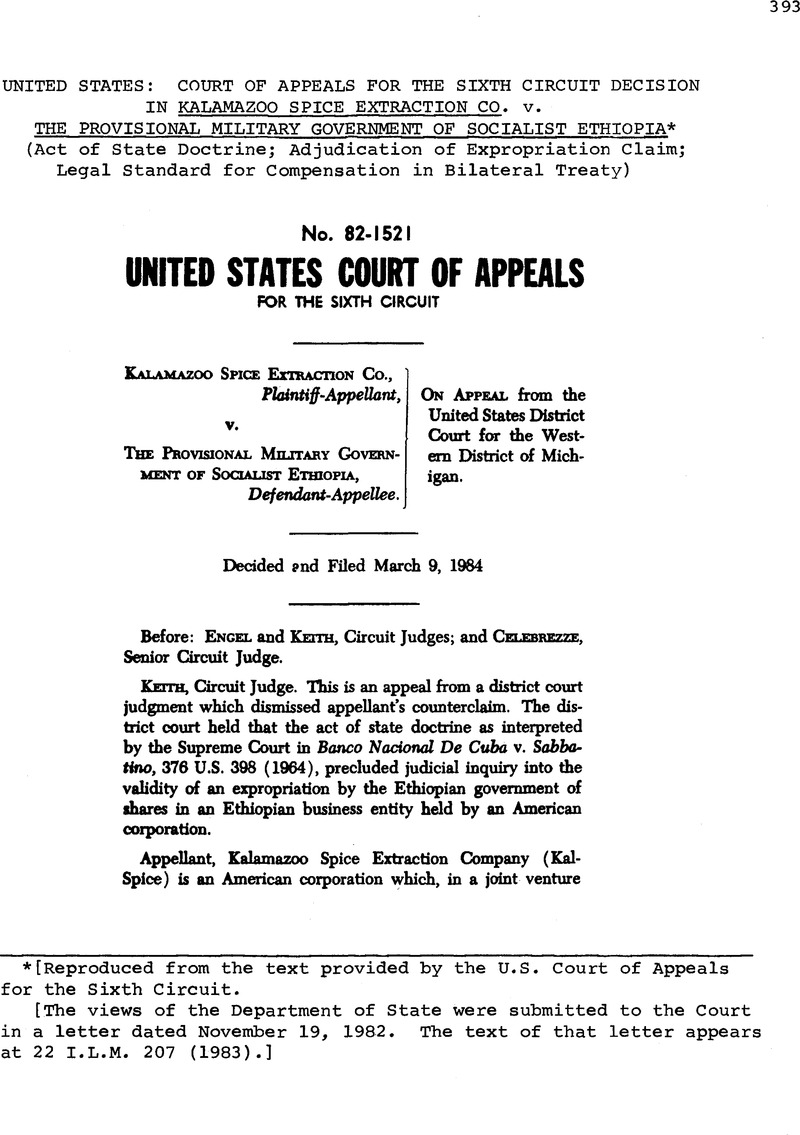No CrossRef data available.
Published online by Cambridge University Press: 04 April 2017

[Reproduced from the text provided by the U.S. Court of Appeals for the Sixth Circuit.
[The views of the Department of State were submitted to the Court in a letter dated November 19, 1982. The text of that letter appears at 22 I.L.M. 207 (1983).]
1 ESESCO originally filed its complaint in the United States District Court for the Southern District of New York. On Kal-Spice's motion the case was transferred to the Western District of Michigan pursuant to 28 U.S.C. § 1404(a).
2 The “Bernstein exception” derives its name from Bernstein v. N.Y. Nederlandsche-Amerikaansche Stpomvaart-Maat-schaapij, 173 F.2d 72 (2d Cir. 1949), modified by, 210 F.2d 375 (2d Cir. 1954) (per curiam) where the State Department advised the Second Circuit that foreign relations considerations did not require the application of the act of state doctrine.
Justice Rehnquist's opinion in Citibank which found the Bernstein exception dispositive was joined only by Chief Justice Burger and Justice White. Justices Douglas and Powell concurred in two separate opinions. Consequently, it appears that the Bernstein exception may have doubtful utility since a majority of the Court did not approve its use.
3 The decision in Dunhill that commercial acts of a sovereign would not be entitled to immunity under the act of state doctrine is known as the “commercial act exception”. However, that exception, like the Bernstein exception, was recognized by only a plurality of the Court. Only Chief Justice Burger and Justices Powell and Rehnquist joined in Justice Whiteɴs opinion creating the exception. Thus, this exception also seems to be of doubtful precedential value.
4 We have provided an appendix to this opinion. Examples of these treaties with provisions for compensation for expropriated property are included. All of these treaties employ similar language.
5 The district court also held that the act of state doctrine was inapplicable because the court was not deciding the validity of Iran's expropriation of the plaintiffs' interest, but rather it was adjudicating the failure of Iran to provide compensation for the expropriated property in violation of international law. It was also decided that the act of state doctrine did not apply because of the commercial act exception of Alfred Diinhill of London, Inc. v. Republic of Cuba, supra. American International Group, 439 F.Supp. at 525.
We decline, however, to reverse the district court on these additional grounds. Our decision to reverse the district court is based only upon the existence of a treaty between the United States and Ethiopia which may provide a basis for Kal-Spice to receive compensation.
6 The Second Circuit relied upon First Notional City Bank v. Banco Nacional de Cuba, 406 U.S. 759 (1972) (Citibank) for its holding that the act of state doctrine was inapplicable. Noting that Citibank was a plurality opinion, the Second Circuit held that the act of state doctrine does not apply where: 1) the executive branch provides a Bernstein letter advising the courts that it believes the act of state doctrine need not be applied; 2) there is no showing that an adjudication of the claim will interfere with foreign relations; and 3) the claim against the foreign sovereign is asserted by way of counterclaim and does not exceed the value of the sovereign's claim. 658 F.2d at 884.